A life-saving venture
by Erika Varga CEO, Defibrillator Plusz Ltd. - Hungary Article published in the Hungarian journal Hiteles Forrás ("Authentic Source")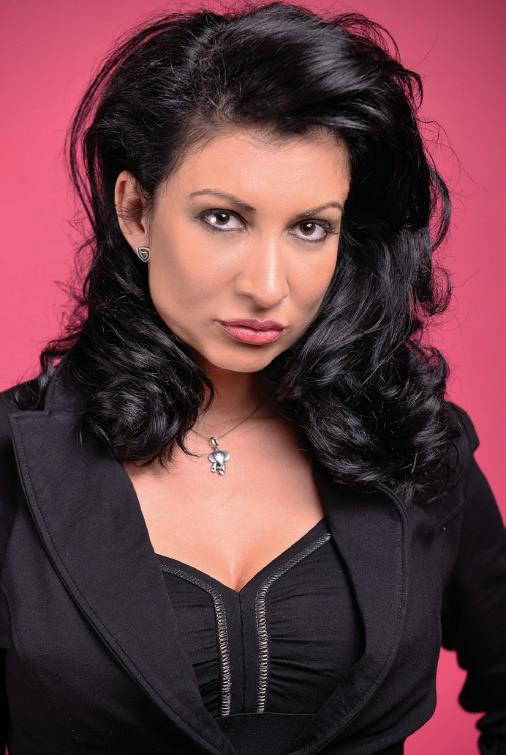
Life and death are often separated by just a few seconds.
A wrong step, an unfortunate accident, a careless action… In these few seconds, it is important whether we have help, whether the transition can be stopped, and whether we can bring people back. Today, technology is capable of miracles. Dozens of defibrillators are available, but people mostly don’t know they exist and don’t know how to use them.
How did it start?
I was 19 when I got to know that my mother had to be resuscitated during an operation in 1992. It was very hard for me to process. But what I learned from my parents when I was little, because they showed me by example, was that if someone was unwell on the street, they would go and help without prejudice. Unfortunately, that’s not what I saw from other people, that’s not what I experienced. I was always concerned about what I could do to change people’s attitudes towards assistance.
I studied the professional background of defibrillators and the technical characteristics of all defibrillators available at that time, which could be used by laypeople, in a course in the Netherlands.
Thanks to professional and competent trainers, I have – some people say – an outstandingly high level of knowledge in this subject. I was responsible for the importation and domestic distribution of a device for non-hospital use, called an automated external defibrillator (AED), and for the arrangement of training related to it.
Since 2011 I have continued this activity through a Hungarian company as the CEO and responsible trainer of Defibrillator Plusz Ltd.
Our company is engaged in the distribution of defibrillators and our goal is to bring the device to as many institutions, hotels, schools, workplaces, clubs, and private homes, as many people as possible, so that we have the chance, knowledge and courage to save lives.
In case of purchase, we offer free training in Basic Life Support (BLS) and defibrillator use.
„Someone’s life may depend on your help!”
I have been a certified basic-level CPR and defibrillator use instructor since 2011.
Training as a resuscitation instructor (BLS-AED instructor) can be completed from the age of 17. The picture shows Gabriella Tóth, our youngest certified instructor, who is setting an example for the younger generation.
In 2011, we conducted a survey in Budapest at the Heart Sound Maying Festival to find out how it would help parents if grandparents could look after their grandchildren by having the knowledge to prevent sudden health loss. The subject is a very broad one, as the banal but dangerous “child eats and swallows wrong” can even lead to death, as has been the case in recent tragic deaths. We would particularly like to involve in our training also persons who are retired but still engaged in childcare to some extent. In April 2013, we held CPR training for water polo coaches and swimming coaches at the Spa of Kecskemét. Of course, a defibrillator was also installed.
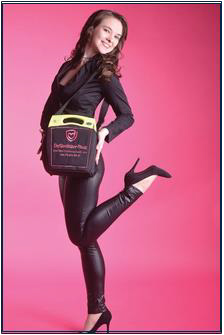
The first life-saver of my students that I know of: on 28 February 2014, I received a call from one of our partners’ safety managers that they needed to use the defibrillator they had installed.
The man who was resuscitated, a 50-year-old truck driver, survived his third heart attack thanks to a young dispatch man who knew how to properly apply the steps of CPR and the defibrillator. Just six months earlier, he had attended a few hours of basic CPR and defibrillator use theory and practical training ensured by the chain’s managers. It is still a good feeling that there are responsible managers in Hungary, such as those in the chain of stores mentioned above, where, as a result of their decision, we organised and carried out the training of hundreds of people in a month or so. I am particularly proud to know this gentleman personally from the training. I have internal motivation, and a sense of responsibility, and every day is worth getting up because I know that
“Someone’s life may depend on your help!”
And I’m here to teach you what to do in an emergency until the ambulance arrives, how to be brave even if you’ve been afraid.
“ We need experienced elderly people”
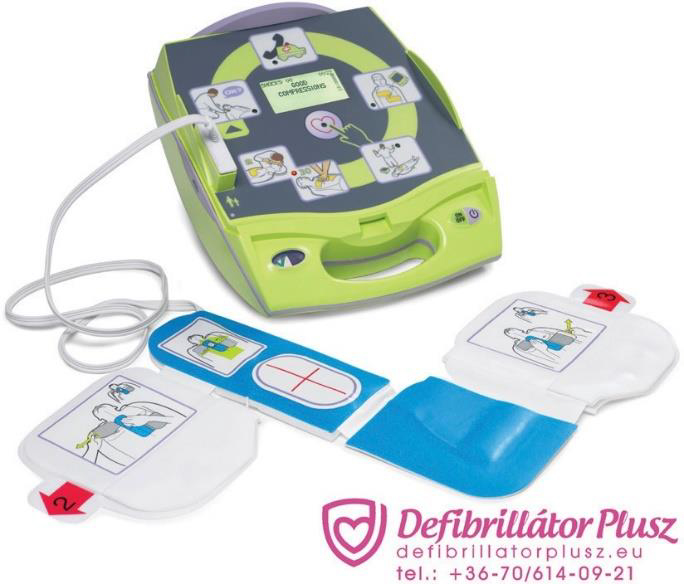
No matter how many degrees you have, or even none at all, what you’ve studied, where you’ve come from, or what you’ve done. If you haven’t had a first aid course, find a good instructor with good equipment and do a training course.
One thing you can never be sure of is that it will never happen to you or around you. Experience has shown that anyone who takes a training course can save lives in practice if necessary. Think about it, if you knew it in advance, you would sign up for a training course right now, even a repeat course if you have been to one before.
We already know that regardless of age, gender, or physical condition, even in young and vigorous sportspeople, a sudden cardiac arrest can occur at any time, in many cases without any warning. In such a case, after 4 minutes the brain can be in a state of oxygen deficiency that can lead to irreversible and permanent neurological damage. CPR and defibrillator use should begin immediately.
Until the ambulance arrives – which in Hungary today is 10-15 minutes on average – the life of a fellow human being in trouble may depend on the attitude and immediate assistance of the people on the scene.
Where is it desirable and justified to place such a life-saving device? Not only where many people pass by. Anywhere where an ambulance is expected to arrive in more than four to five minutes. In some countries, it is already available in the homes of families.
Nowadays, companies and institutions with health-conscious attitudes are increasingly recognising and taking the necessary steps for prevention. Knowledge of first aid is not just a matter of education and especially not of age. It can be an advantage in all areas of life, in leisure activities, at home, in the family and at work.
We definitely need older people, because they have a lot of experience in many areas of life, and in some cases, we ask them for advice.
In order to ensure that they are able to take care of themselves, each other and even us, I believe it is essential that they have first aid skills.
7-year product guarantee
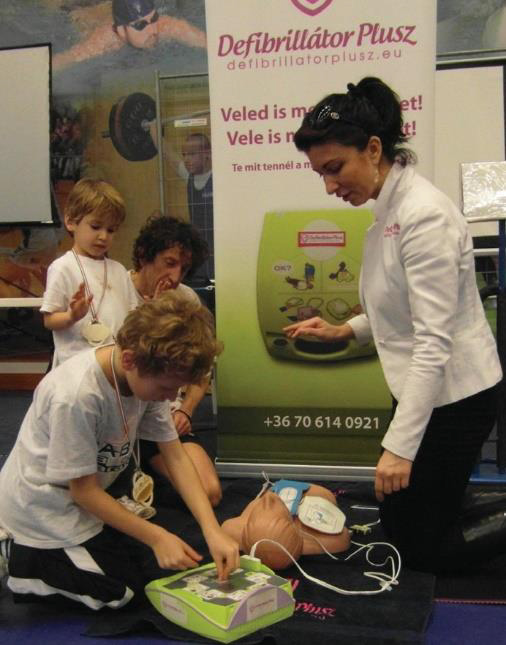
In the meantime, I have obtained a higher degree in andragogy specialising in Adult Education Management and Geronto-andragogy. I can now say I am actively involved in elderly education.
More than 300 people over 60 attended our first lecture on “First Aid in Old Age”. We gave them an insight into the practical steps of CPR, which they had the opportunity to try out with the help of several manikins. They also had the opportunity to try out the use of a defibrillator through a device connected to a simulator.
The scope of my thesis was related to my practical work, and the topic of my Master’s thesis could not have been other than the role of adult education in first aid education and its opportunities.
In Hungary, sudden cardiac death is a leading cause of death. Of the 50 000 cardiovascular deaths per year, 20 000 occur outside hospitals. Unfortunately, few people know that regardless of age, gender, physical condition, and in many cases without warning, cardiac arrest can occur at any time. Ambulances rarely arrive in 4 minutes. Few people know what to do in an emergency, how to save a life, or even resuscitate. There are few people who have the right information, and training, people who often don’t know what to do, or don’t have a defibrillator. Our aim is to contribute to a radical change in this situation – to have CPR-trained staff and defibrillators everywhere.
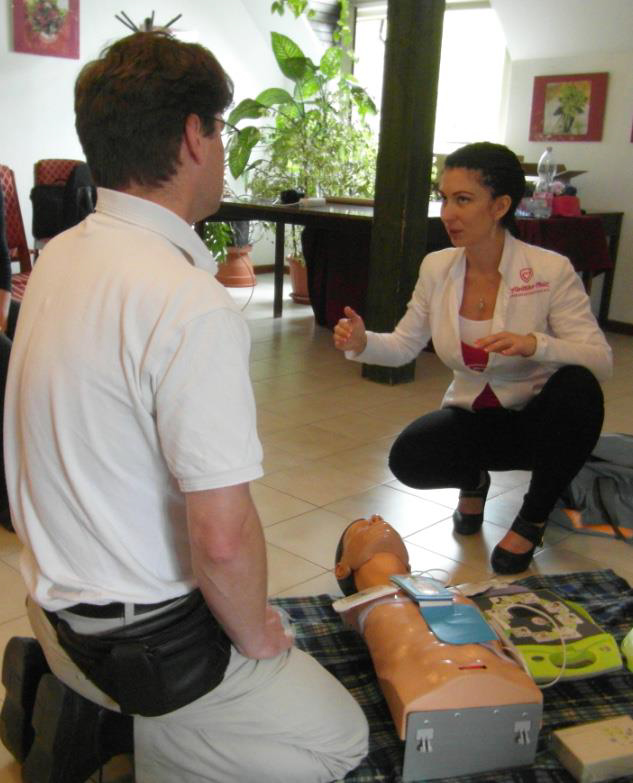
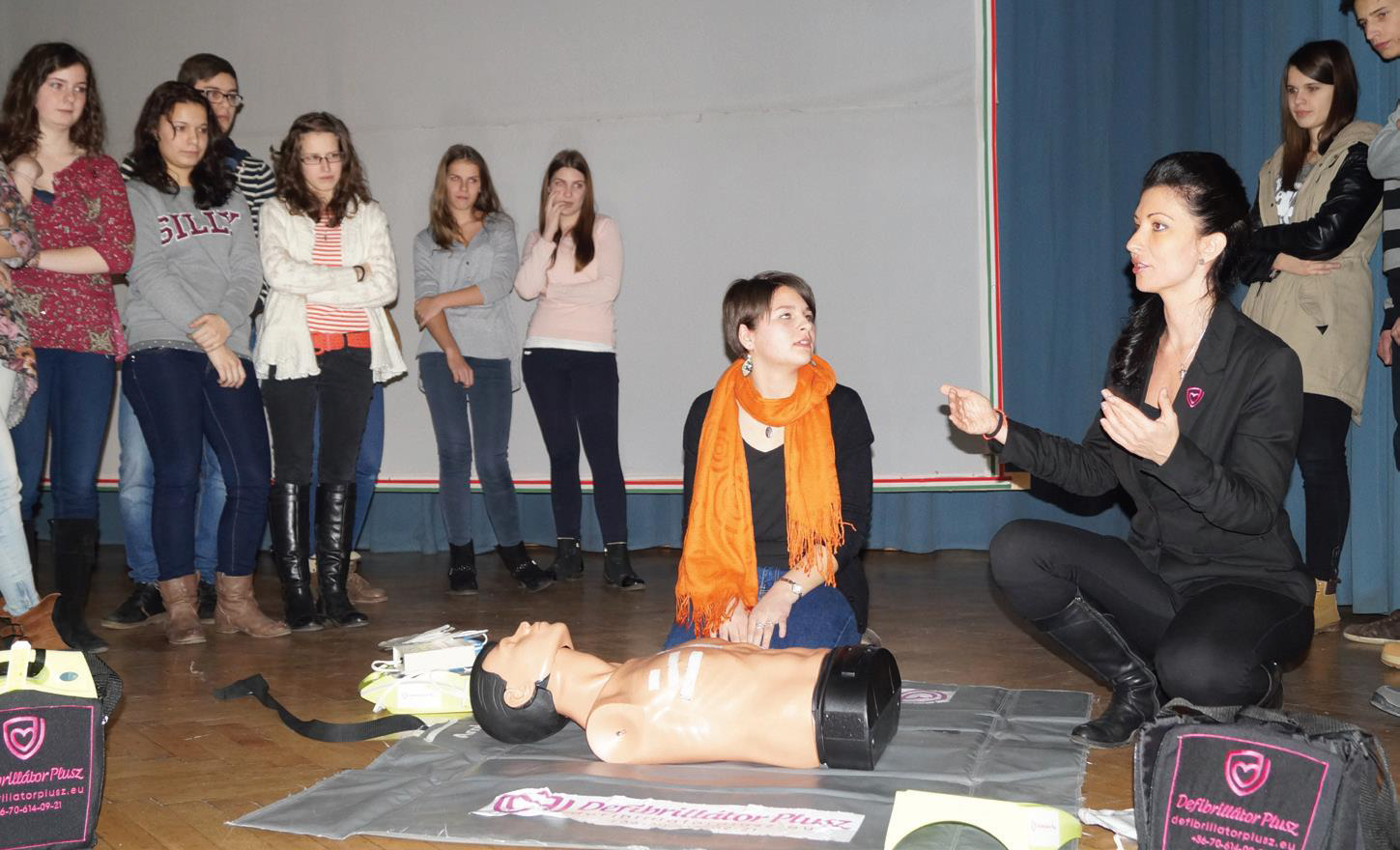
There are many different types of defibrillators available on the market, but most of them are expressly designed for professional use, i.e., for use only by healthcare professionals in a specific professional environment.
The device we distribute is an automatic external defibrillator (AED) that can be used without any special qualifications (after a short training).
Its unique feature is that it cannot only deliver an electric shock (if it is needed at all, as in half of the cases it is not even recommended) but also guide you through the entire resuscitation process. It has a unique graphical interface: a combination of lights, diagrams, texts, voice prompts and feedback assist the rescuer in every move. It works with a single, integrated pair of electrodes. With the appropriate electrode, it can also be used to resuscitate children from new-born age. The only AED that monitors and helps create the right chest compressions. The life-saver, therefore, receives continuous feedback and guidance to be able to provide real resuscitation assistance. The device works with commercially available lithium batteries. It offers additional benefits such as a 7-year warranty, the lowest maintenance costs in its product category, full compatibility with official international professional guidelines and standards, and software upgrade possibility.
Domestic customers are responding positively to these benefits. To illustrate the diversity of the organisations interested, the reference list includes, among others, a large chain of supermarkets, a network of spas, a county chamber of commerce and industry, a university of science, a medical non-profit association, shopping malls, office buildings, banks, car showrooms, etc. We have already successfully implemented educational projects for teachers, police officers, firemen, lifeguards, water polo and swimming coaches mentioned above, or for visually impaired children and their teachers at the school for the blind.
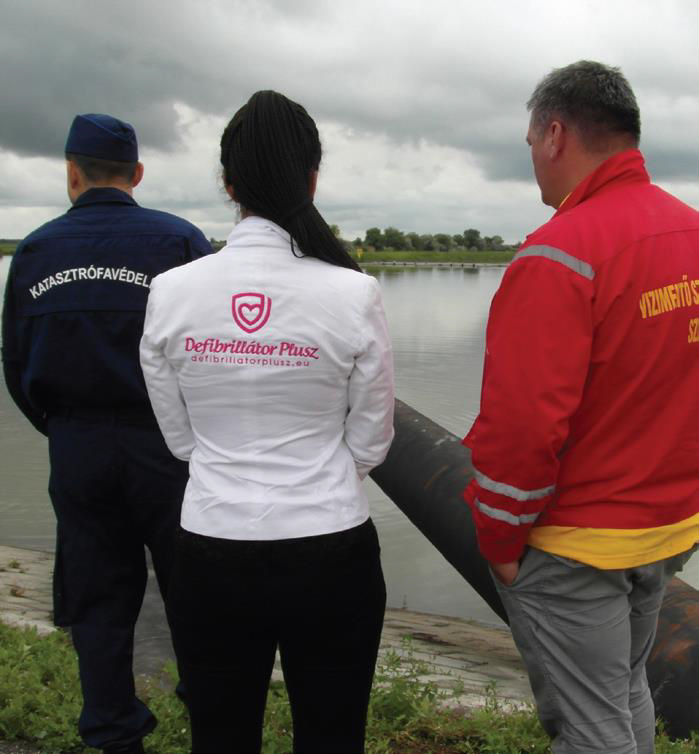
For its part, Defibrillator Plusz Ltd. will continue to do its utmost to contribute to the solution of national development tasks. A good tool for this could be participation in EU tenders. We plan to ensure the continued growth of the business by focusing our activities increasingly on the distribution of a wider range of products and services in the field of first aid as a complex package, in addition to the provision of ad hoc equipment and training, in the context of targeted and tailored health protection projects. Social Responsibility will remain an important part of our business and we are looking for responsible business leaders who want to keep their employees, customers and of course themselves and all the people around them safe.
Download in PDF
Article in Hiteles Forrás